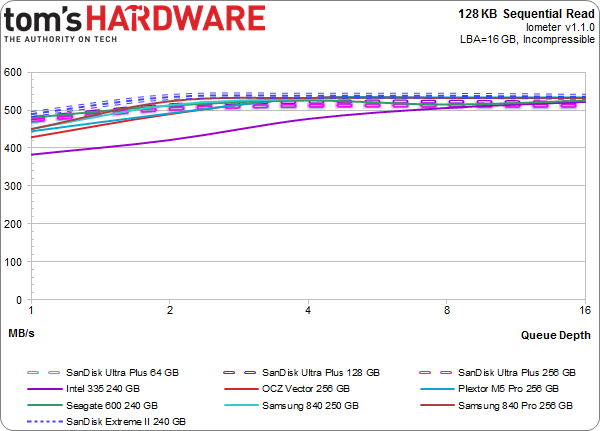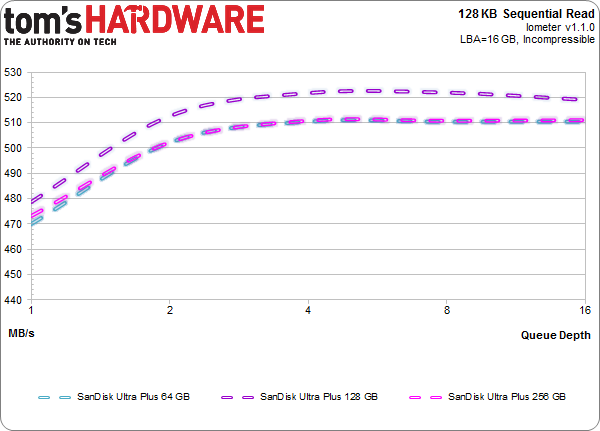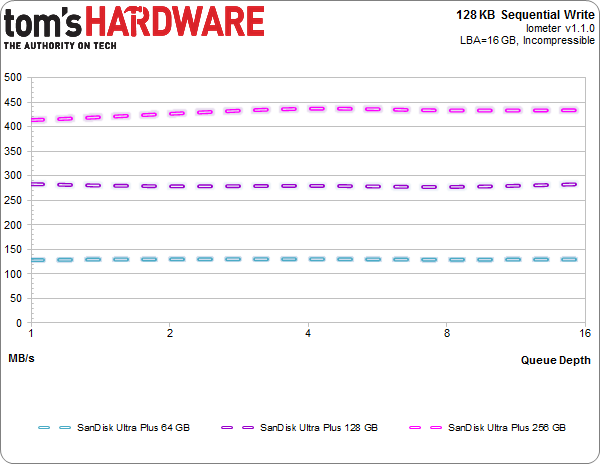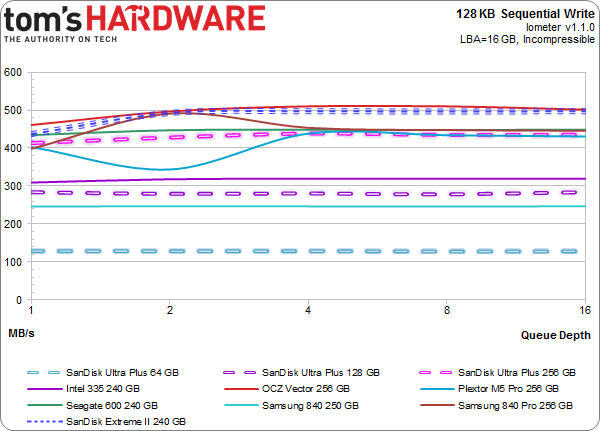SanDisk Ultra Plus SSD Reviewed At 64, 128, And 256 GB
SanDisk's Ultra Plus replaces the company's older SATA 3Gb/s SandForce-based Ultra with something a bit more modern, and with a budget-oriented price tag. We test all three capacities to see if the entry-level pricing belies a pocket rocket in disguise.
Results: 128 KB Sequential Performance
Once again, we turn to Iometer to measure the most basic performance parameters.
Fantastic sequential read and write performance is a trademark of modern SSDs. To measure it, we use incompressible data over a 16 GB LBA space, then test at queue depths from one to 16. We're reporting these numbers in binary (where 1 KB equals 1024) instead of decimal numbers (where 1 KB is 1000 bytes). When necessary, we're also limiting the scale of the chart to enhance readability.
128 KB Sequential Read
Despite lower capacities and more aggressive pricing, San Disk's Ultra Plus excels in sequential reads. The Plus drives even contend for first place with a single outstanding command. At higher queue depths, every drive is locked in a massive SATA 6Gb/s dog pile.
When we break out SanDisk's drives from the comparative data, we can adjust the scaling to pick out more subtle differences between them. After several runs, the 128 GB model puts a bit of distance between the larger and smaller capacities, though that's just a few MB/s.
There is a bit (just a bit, mind you) more variance from one run to the next than you might expect, which could be an artifact of the nCache system. Regardless, we come away knowing that read performance isn't a weak point of these drives. At least not sequential reads. We'll look at random reads on the next page.
128 KB Sequential Write
Get Tom's Hardware's best news and in-depth reviews, straight to your inbox.
The three Ultra Plus drives stack up much as you'd expect. The largest model peaks just under 450 MB/s, placing it among the most elite SSDs. SanDisk's 128 GB drive tops 280 MB/s, while the the 64 GB version falls just shy of 130 MB/s.
Scaling is smooth, too. Throughput doesn't increase based on outstanding commands, but rather with the addition of more flash. That's just SSD Architecture 101, though witnessing the tangible results helps put capacity into perspective. Size really does matter in this case.
When we drop in comparative data from other 240/256 GB-class drives, it quickly becomes apparent that the 256 GB Ultra Plus trades blows with the highest-end SSDs, while the mid-range 128 GB is merely competitive. The 64 GB Ultra Plus brings up the rear, enabling half the speed of the closest 200+ GB drive. That's not to shabby though, considering the only other 60/64 GB products offering similar write speeds do it with twice the die count (or are SandForce-based products working with easily compressible zero-fill data).
Near as we can tell, the Ultra Plus and Samsung 840 are pretty close competitors based on their performance and pricing. SanDisk's Ultra Plus gets the nod in sequential writes at 128 and 256 GB, but that's just one performance measure. The Ultra Plus has fewer memory channels at its disposal, while Samsung's three-bit-per-cell MLC (or TLC) leads to hobbled write speeds.
Current page: Results: 128 KB Sequential Performance
Prev Page Test Setup And Benchmarks Next Page Results: 4 KB Random Performance-
kevith I have had the former SanDisk Extreme 128 GB for a year now, and it´s definitely fast enough. But what´s more impressive is, that after a year, the write amplification still hovers between 0,800 and 0,805. I´m using it in my laptop for quite "normal" use, FB, YouTube, mail, wordprocessing etc.on Windows 8 64-bit. So far it has served me very well, my next SSD is going to be another SanDiskReply -
Soda-88 I recommended this SSD (256GB) to my friend just a week ago since it was nearly as cheap as top of the line 128GB SSDs, glad to read positive review.Reply -
alidan im honestly looking into ssd drives for games and mass small file storage.Reply
these are cheap, and they are large, would definitely help with load times/game performance, and browsing images stored enmass. -
Brian Fulmer I ordered 5 Extreme 128GB drives in March (model SDSSDHP-128G). I've been using OCZ, Kingston, Samsung and Crucial drives in every desktop and notebook I've deployed since August 2013. Out of ~75 drives, I've had 1 bad Vertex 4 and 6 defective by design Crucial V4's. Of the 5 SanDisks, 2 failed before deployment. Support was laughably incompetent in demanding the drives be updated with the latest firmware. Their character mode updater couldn't see the drives, because they DIED. SanDisk is no longer on my buy list.Reply
Incidentally, of the 8 SSD model SSD P5 128GB, I've had one die. The context should be of 35 Vertex 4's, I've had one die. I've had zero failures with 15 840's despite their supposedly fragile design. -
ssdpro Brian Fulmer's comments are very reasonable (except the "deployed since Aug 2013" part lol). Way too many people experience a failure then scream all drives from that mfg are junk. I have owned 2 840 Pro drives and had one fault out. Does that mean Samsung drives have a 50 percent failure rate? For me, yes, but overall no and I am definitely not that naive. The 840 Pro can and do fail like anything electrical can. I have owned probably a dozen OCZ drives and had one Vertex 2 failure - does that mean OCZ/SandForce firmware stinks and they aren't reliable? No, it just means a drive died and who knows why. I have owned a couple SanDisk products and none failed. Does that mean SanDisk is the best? No... it just means I didn't have one die but I also only sampled 2.Reply -
Combat Wombat These and the OCZ drives from newegg are looking mighty close in price!Reply
BF4 Rebuild is about to take place :D -
@ssdpro: spot on. sure, if i buy from vendor a and his product fails, i will probably not buy from him again. if it fails more than once, there is no chance i'll buy his stuff again and i also will warn others about it. but understandable as this is, in the end even that doesn't mean much about the reliability of the manufacturer.Reply
that's also why i'm a bit sceptical about product ratings on amazon and the likes, since people are more inclined to complain about a bad experience, than share their view on a product that simply does what it should do: work.
what we would need more often are statistics from bigger companies, or even repair services, so we don't have to base our purchases on samples of a few dozen to a few hundreds, but on thousands upon thousands of cases. -
flong777 The 840 Pro still appears to be the fastest overall SSD on the planet - but the difference between the top 5 is pretty much negligible. Among the top five, reliability and cost become the determining factors.Reply -
anything4this I don't understand the ~500MBs read limit on the drives. Is it an interface bottleneck?Reply



